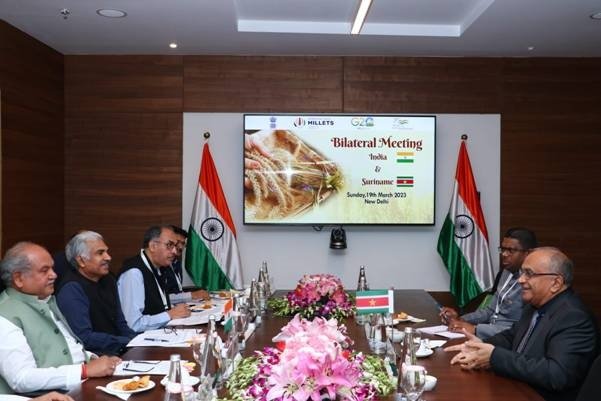India WFP sign MoU at Global Millets Conference
Narendra Singh Tomar holds bilateral meetings with the ministers of Guyana, Suriname, Zambia, Mauritius and Sri Lanka
Narendra Singh Tomar Union Agriculture and Farmers Welfare Minister held bilateral meetings with Agriculture Ministers of various countries participating in the Global Millets (Shree Anna) Conference. An MoU was also signed with the World Food Programme (WFP) of the United Nations.
Narendra Singh Tomar lauded the work of WFP in promoting food self-sufficiency and supporting governmental and global efforts to ensure long-term solutions to the challenge of hunger.
At the conference, Tomar also thanked the ministers for being a part of the global conference organised by India with the aim of promoting Shree Anna, under the International Year of Millets (IYM).
He said that the International Year of Millets is being celebrated so that the Indian Shree Anna, its recipes, and value-added products are accepted globally as a people’s movement. He hoped to further strengthen India’s agricultural ties with various countries.
During the global conference, the MoU between WFP and the Government of India for cooperation between 2023-2027 was signed in the presence of the Tomar Agriculture Minister. Manoj Juneja, Deputy Chief Executive Director, Management and Chief Financial Officer of UNWFP, and Elizabeth Faure, WFP Representative and Country Director in India were present.
Meanwhile, he held bilateral meetings with his counterparts from various countries participating in the Global Millets Conference. In a meeting with Minister Zulfikar Mustafa, Guyana’s Agriculture Union Minister Tomar recalled the visit of Mohammad Irfan Ali, President of Guyana, and Bharat Jagdev, Vice-President of Guyana and said that agriculture is a very important area of cooperation between the two countries.
“India is keen to share its expertise and experience in the development of agriculture and allied sectors in Guyana, for which an MoU is under finalisation. He assured that Guyana’s request for the deputation of two experts to ITEC from India for three years to support the Guyana Sugar Corporation management and revive the sugar estates and plants in Guyana would be considered at the earliest,” said Tomar.
Apart from Guyana, Tomar also held meetings with his counterparts from Zambia, Suriname, Mauritius, and Sri Lanka.
Narendra Singh Tomar holds bilateral meetings with


